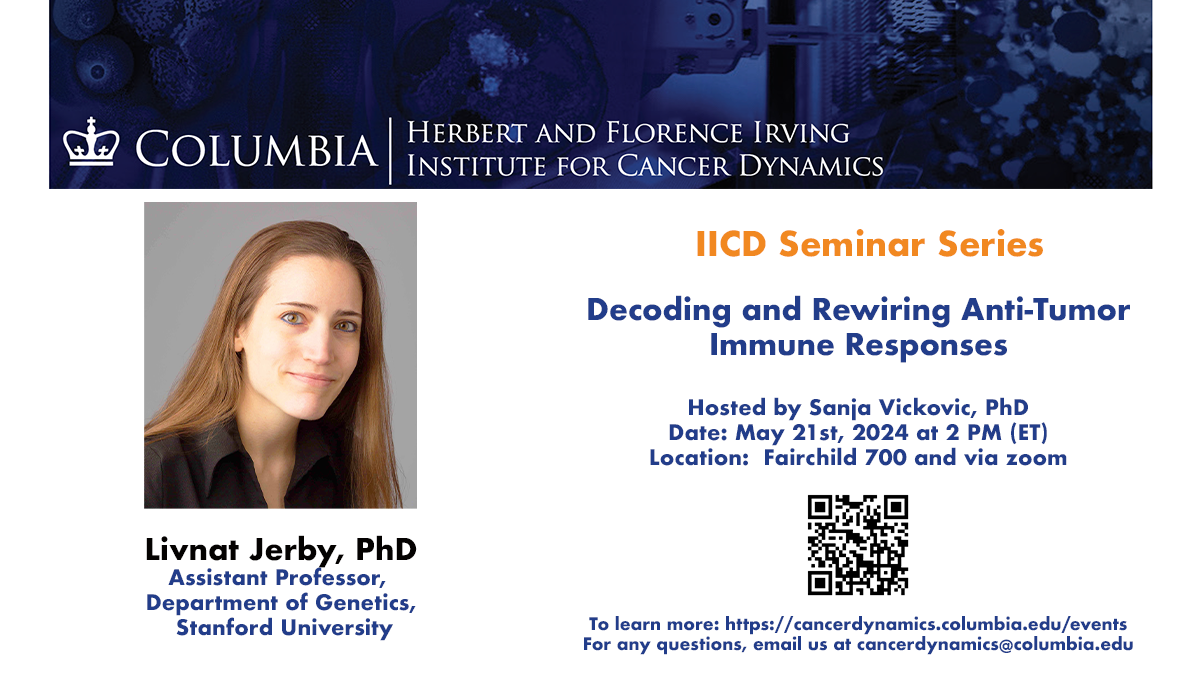The Herbert and Florence Irving Institute for Cancer Dynamics will continue its seminar series on the topic of mathematical sciences underpinning cancer research during the 2022-2023 academic year. The monthly seminars take place on the second Wednesday of the month, 2:00-3:00 PM EST. The presentations are open to the Columbia community (in person and online) and to researchers outside Columbia (via Zoom).
On Wednesday, May 21st (2:00 PM ET), IICD welcomes Livnat Jerby, Assistant Professor, Department of Genetics, Stanford University. Seminar hosted by Sanja Vickovic. The seminar will take place in person in Fairchild 700 (Morningside Heights campus). If you wish to attend the seminar remotely, please register using the following link: https://columbiauniversity.zoom.us/meeting/register/tJAvdeCrpz4oG9BensD7_BX1-XpyXeVIVfec
Title: Decoding and Rewiring Anti-Tumor Immune Responses
Abstract: Complex phenotypes often result from the collective behavior of diverse cell populations, as manifested in the remarkable ability of the immune system to distinguish between “self” and “non/dysfunctional-self”. In this talk I will describe our ongoing efforts to probe, trigger, and rewire immune responses in new and more precise ways. The first part of the talk will focus on studies aiming to uncover gene function and perturbation effects through the lens of multicellular regulation by mapping the spatial organization of tumors across large patient populations in combination with data-driven experimental design and high content CRISPR screens. This line of studies is beginning to map the genetic basis of cancer immune evasion and reveal new (RNA-based) mechanisms to selectively sensitize (only) cancer cells to immune attacks. In the second part of the talk, I will describe how we are using (epi)genetic editing in combination with directed evolution to engineer immune cells to sense cancer cells in new ways and better migrate and infiltrate into tumors. This line of studies revealed a yet underappreciated metabolite-based cancer-immune interplay that provides a new path to recruit engineered lymphocytes to the tumor via (epi)genetic activation of metabolite sensing receptors.
Bio: Livnat Jerby is an Assistant Professor in the Department of Genetics at Stanford University, a Chan Zuckerberg Biohub Investigator, and a Paul Allen Distinguished Investigator. Livnat leads a multidisciplinary research team that is pursuing novel avenues to tackle fundamental challenges in studying and leveraging multicellular processes as a disease driver and therapeutic modality. Using engineering-based, high-throughput approaches, her laboratory develops "hybrid" platforms across in-vitro/in-vivo/in-silico systems to identify new immunomodulating mechanisms and interventions. Recent work from her lab uncovered previously underappreciated aspects of the anti-tumor immune response and new modalities for immune cell engineering. Before joining Stanford, Livnat was a postdoctoral fellow in Aviv Regev’s lab at the Broad Institute of MIT and Harvard. She was among the first to use single cell genomics to study resistance to immunotherapy directly in patients and subsequently in combination with single cell CRISPR screens. Livnat holds a BSc in Computer Science and Biology and obtained her PhD from Tel Aviv University, where she worked with Eytan Ruppin, studying genetic interactions in cancer.
If you would like to meet one-on-one (possibility via zoom) or attend the lunch or dinner with the speaker, please contact the event organizer.

